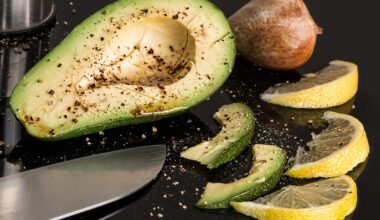The Effect of Post-Workout Nutrition on Muscle Fatigue and Repair
Post-workout nutrition plays an essential role in the recovery process following strength training sessions. After intense workouts, muscle fibers experience micro-tears, leading to fatigue and soreness. Nutrients consumed post-workout aid in the repair and rebuilding of these fibers, ultimately enhancing performance. The critical components of post-workout nutrition include carbohydrates and proteins. Carbohydrates replenish glycogen stores depleted during exercise, while proteins provide the necessary amino acids for muscle repair. Studies show that consuming a balanced meal or supplement shortly after a workout can significantly reduce muscle damage and decrease recovery time. Additionally, timing is crucial; a window of up to 30 minutes post-exercise is often cited as optimal for nutrient absorption. Athletes are encouraged to incorporate a carefully timed post-workout meal consisting of 20-30 grams of protein and a similar amount of carbohydrates. This intends to promote fast recovery and muscle hypertrophy. Furthermore, hydration is equally essential in post-workout nutrition, as it aids in nutrient transport and overall recovery.
In addition to essential macronutrients, micronutrients also play a vital role in muscle recovery after strength training workouts. Vitamins and minerals, including zinc, magnesium, and vitamins C and E, contribute to muscle health and repair processes. These nutrients assist in protein synthesis and reducing oxidative stress on muscles during recovery. Hence, including a variety of fruits and vegetables in post-workout meals is beneficial. Berries, for instance, are rich in antioxidants that help combat inflammation and muscle soreness. Bananas provide potassium, which is essential for muscle function, while leafy greens offer valuable vitamins and minerals. Staying well-rounded in nutrient intake contributes significantly to effective recovery. Furthermore, individuals practicing strength training should consider their unique dietary needs based on factors like intensity, duration, and personal fitness goals. Experimenting with different food combinations can help identify what works best for each individual. It may be worth consulting with a nutritionist to optimize dietary strategies post-exercise and facilitate greater progress. Understanding the importance of nutrition in recovery allows for better performance in future workouts.
The Role of Protein in Muscle Repair
Protein is heralded as the cornerstone of post-workout nutrition, particularly for those engaged in strength training. Consuming adequate protein after workouts stimulates muscle protein synthesis, which is essential for muscle growth and repair. This process focuses on repairing damaged muscle fibers, leading to enhanced muscle strength and size over time. High-quality protein sources include lean meats, dairy, and plant-based options like lentils and quinoa. Research has shown that a post-workout protein intake of 20 to 30 grams can significantly enhance recovery efforts. Specifically, whey protein is favored by many athletes due to its quick absorption rate and effectiveness in boosting muscle repair. Moreover, consuming protein in conjunction with carbohydrates can create a synergistic effect that maximizes recovery benefits. Therefore, post-exercise meals that combine these macronutrients should become a norm for strength training enthusiasts. It is advisable to focus on the quality of protein sources as well as quantity to ensure optimal recovery. Additionally, proper planning and preparation of meals before training sessions can simplify achieving optimal nutrient intake.
Another critical aspect of post-workout nutrition is hydration and electrolyte balance. During strength training, significant amounts of fluids are lost through sweat, leading to dehydration. It is imperative to replace these fluids promptly to support metabolic processes and overall recovery. Water is often sufficient for rehydration, but during intense training sessions, sports drinks containing electrolytes may be beneficial. Electrolytes, particularly sodium and potassium, are essential for maintaining fluid balance and supporting muscle function. Dehydration can lead to muscle cramps, fatigue, and delayed recovery times, which can hinder workout performance. Therefore, monitoring hydration levels before, during, and after training is advisable. Moreover, a clear indicator of adequate hydration is the color of one’s urine; pale yellow suggests hydration, whereas dark yellow indicates dehydration. Incorporating hydrating foods into post-workout meals, such as watermelon or cucumber, can also help replenish fluids and provide additional nutrients. Ultimately, establishing a routine for hydration in conjunction with proper nutrition will instigate better results in strength training goals.
Fiber and Digestive Health
A balanced post-workout meal should also reasonably include dietary fiber, which plays a significant role in digestive health and overall nutrition. While high-fiber foods are beneficial, it is essential to consider timing as fiber can slow digestion, potentially interfering with the absorption of needed nutrients post-exercise. For athletes engaged in heavy strength training, meals that combine moderate fiber levels can support satiety and provide essential vitamins and minerals. Foods like oats, whole grains, and certain fruits contain soluble and insoluble fibers that aid digestion without excessively delaying nutrient absorption when consumed after strength workouts. Furthermore, fiber supports gut health, which is vital for the effective absorption of nutrients consumed during recovery. Including fiber in moderation will ensure athletes enjoy digestive benefits while still optimizing nutrient uptake at critical recovery windows. Creating balanced meal options that incorporate the right fiber levels alongside proteins and carbohydrates helps improve overall post-exercise recovery. Striking this balance is vital for sustained energy levels and efficient muscle repair.
Another crucial factor to consider in post-workout nutrition is the influence of individual dietary preferences and restrictions. With the rise of various dietary trends, strength athletes may have different approaches to their nutrition, including vegetarianism, vegan diets, or ketogenic approaches. Understanding these preferences is essential as it can impact meal planning and nutritional adequacy. For instance, plant-based athletes must prioritize protein sources that provide all essential amino acids, such as a combination of legumes and grains. Furthermore, those following specific diets should consider their unique recovery needs and ensure that meals are nutrient-dense. A well-rounded approach to post-workout nutrition, regardless of dietary preferences, is crucial. Consulting with registered dietitians can offer personalized guidance and meal plans that align with workout goals. Ultimately, recognizing that each athlete’s nutritional requirement post-exercise is distinct paints a more comprehensive picture of recovery strategies in strength training dynamics. Developing tailored nutrition plans can significantly enhance one’s overall performance and recovery outcomes.
Conclusion
In conclusion, post-workout nutrition significantly impacts recovery from strength training by aiding muscle repair and reducing fatigue. The combination of protein and carbohydrates is fundamental to successful post-exercise meals, enabling optimal recovery and performance enhancement. Additionally, factors such as hydration and micronutrient intake play essential roles in ensuring that athletes recover effectively from intense training sessions. As people continue to explore dietary preferences, adapting nutrition strategies to individual needs is important for achieving specific fitness goals. With a strong understanding of how to fuel the body appropriately post-workout, athletes can maximize their progress in strength training while minimizing discomfort. Therefore, it is recommended that individuals be mindful of their food choices and meal timing after workouts. Properly planned post-exercise meals that cater to unique dietary needs will pave the way for continuous improvement and better endurance. By committing to optimized post-workout nutrition, athletes not only bolster their performance but also promote long-term health and well-being.
Through this informed approach, anyone engaged in strength training can harness the potential of nutrition to amplify results.


